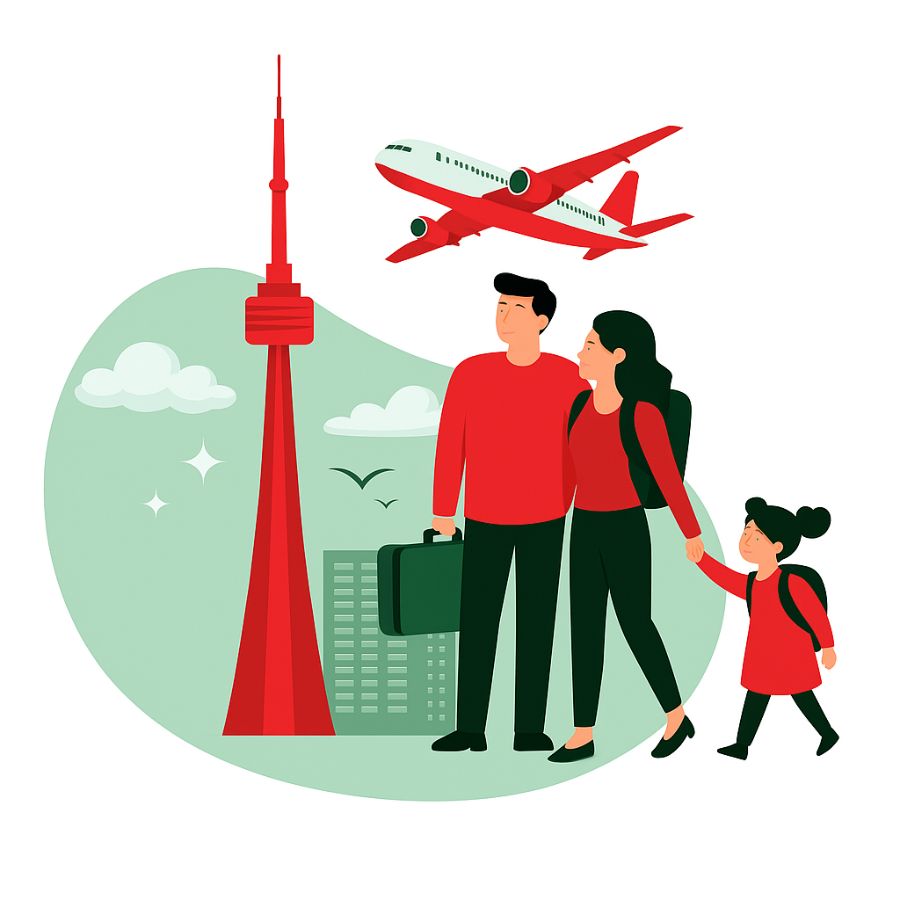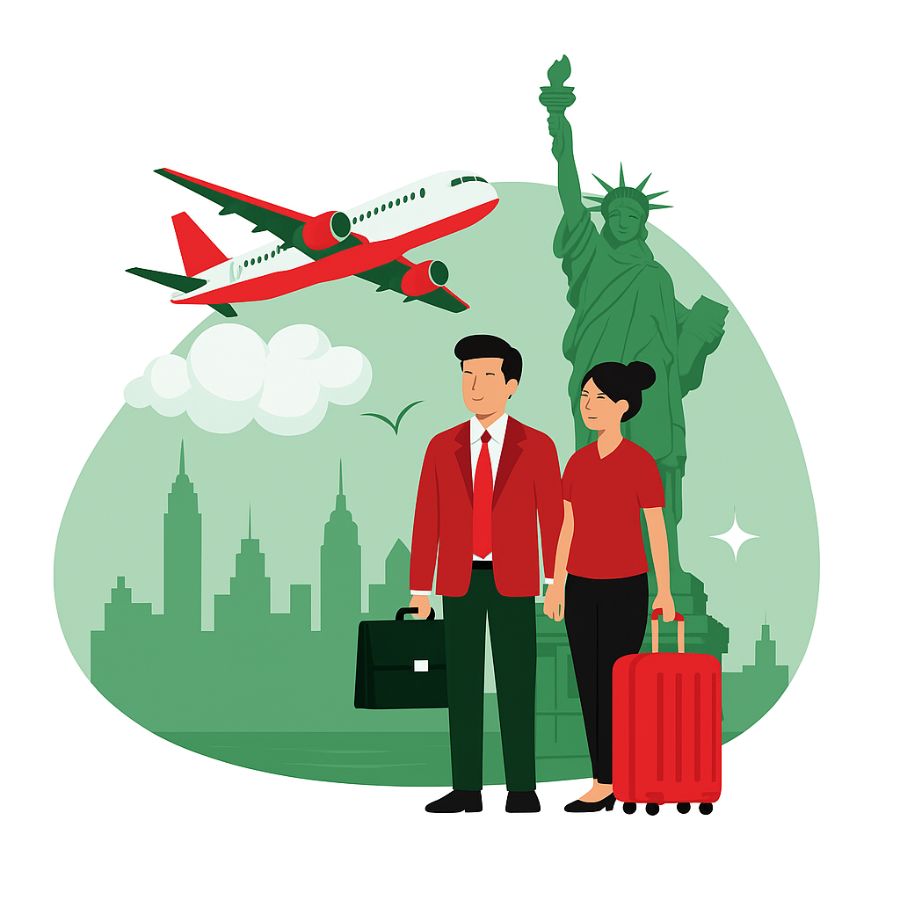
Immigrating to Canada not only opens up attractive career opportunities but also offers one of the world’s highest quality living environments. With a stable, growing economy and open immigration policies, Canada welcomes new immigrants to build their future.
Depending on your qualifications and goals, you can choose from various immigration programs, each with its own advantages.
At SIEC, we understand that choosing the right program and preparing an accurate application are crucial factors. With over 20 years of experience, our team of specialists will create a personalized roadmap to help you and your family quickly settle into your new life.

The “American Dream” is more than just a concept; it’s a goal for millions worldwide. Immigrating to the US provides access to a leading economy, a renowned education system, and a life of freedom and dynamism.
US immigration law provides various pathways, each tailored to different individuals and specific circumstances.
Given the complexity of US immigration law, having a knowledgeable partner is crucial. With extensive experience and deep understanding, SIEC will help you select the right pathway, prepare a persuasive application, and maximize your chances of success.



SIEC is an accredited consultancy specializing in study, travel, and settlement services for Canada and the United States.

Here are the golden words from our clients that vouch for the professionalism and transparency of our immigration services.
Both countries have numerous immigration programs, but they can generally be divided into the following main categories:
In Canada:
Skilled Worker (Economic) Class: This is the most common pathway, managed through the Express Entry system (which includes the Federal Skilled Worker Program, Canadian Experience Class, and Federal Skilled Trades Program) and the Provincial Nominee Programs (PNP). These programs select candidates based on a points system (age, education, work experience, language proficiency).
Family Sponsorship: Canadian citizens or permanent residents can sponsor their spouse/partner, children, parents, or grandparents.
In the USA:
Family-Based Immigration: This is the most common path to obtaining a Green Card. U.S. citizens can sponsor their spouse, children, parents, and siblings. Permanent residents (Green Card holders) can sponsor their spouse and unmarried children.
Employment-Based Immigration: For skilled workers, professionals, or investors. The most common categories are from EB-1 to EB-5, with the EB-3 category (skilled workers, professionals, and other workers) being of high interest.
Diversity Visa Program (Green Card Lottery): Each year, the U.S. grants approximately 55,000 visas to citizens of countries with historically low rates of immigration to the U.S.
Requirements will vary depending on the specific program, but here are the core factors:
In Canada (Express Entry System):
Work Experience: A minimum of 1 year of continuous, paid work experience in a skilled occupation (NOC/TEER 0, 1, 2, or 3).
Language Proficiency: Required proficiency in English or French, with a minimum of CLB 7 (equivalent to IELTS 6.0 in all skills) for the Federal Skilled Worker program.
Education: A high school diploma or higher is required, and it must be assessed and converted to Canadian standards through an Educational Credential Assessment (ECA).
Points Score: Candidates must achieve a sufficient score under the Comprehensive Ranking System (CRS) to be invited to apply.
In the USA (Using the EB-3 Visa as an example):
Job Offer: A full-time, permanent job offer from a U.S. employer is required.
Labor Certification: The employer must prove to the U.S. Department of Labor that there are no qualified U.S. workers available for the position.
Job Requirements: The candidate must meet the educational, training, or experience requirements demanded by the job.
Application processing times can vary significantly depending on the program, country, and application backlog.
In Canada:
Express Entry: After receiving an Invitation to Apply (ITA), the target processing time is approximately 6 months.
Provincial Nominee Program (PNP): Provincial processing can take several months, followed by an additional 6-12 months for federal processing.
Family Sponsorship: Processing time for spousal sponsorship applications is typically between 12 and 24 months.
In the USA:
Employment-Based (EB-3): This process can take several years due to waiting for Labor Certification and for the priority date to become current, depending on the monthly Visa Bulletin.
Family Sponsorship: Wait times can range from approximately 12-18 months (for spouses of U.S. citizens) to over 10 years (for siblings of U.S. citizens) due to annual visa quotas.
Cost is a critical factor and requires careful preparation. In addition to legal fees, other costs include:
In Canada:
Government Fees: Approximately CAD $1,365 per adult for Express Entry programs (including application processing and right of permanent residence fees).
Other Costs: Includes language test fees (approx. CAD $200-300), Educational Credential Assessment (ECA) fees (approx. CAD $200-300), medical exams, and police certificates.
Proof of Funds: Federal Skilled Worker applicants must prove they have sufficient settlement funds (for example, a single person needs CAD $13,757).
In the USA:
Government Fees: Costs can amount to several thousand USD, including filing fees for Form I-140 (employment-based), Form I-130 (family-based), processing fees at the National Visa Center (NVC), and the Green Card fee. For example, the filing fee for Form I-130 is $535.
Other Costs: Medical examinations and costs related to gathering documents.
The choice depends entirely on your goals, personal circumstances, and priorities.
Choose Canada if you prioritize:
A clear immigration pathway based on a transparent, points-based system (Express Entry).
Universal healthcare and a strong social safety net.
A safe living environment, with a more affordable cost of living in many cities compared to major U.S. cities.
Choose the USA if you prioritize:
Diverse job opportunities, especially in high-tech industries, finance, and entertainment.
The world’s largest and most dynamic economy.
A diverse climate and distinct cultural differences between states.
“`